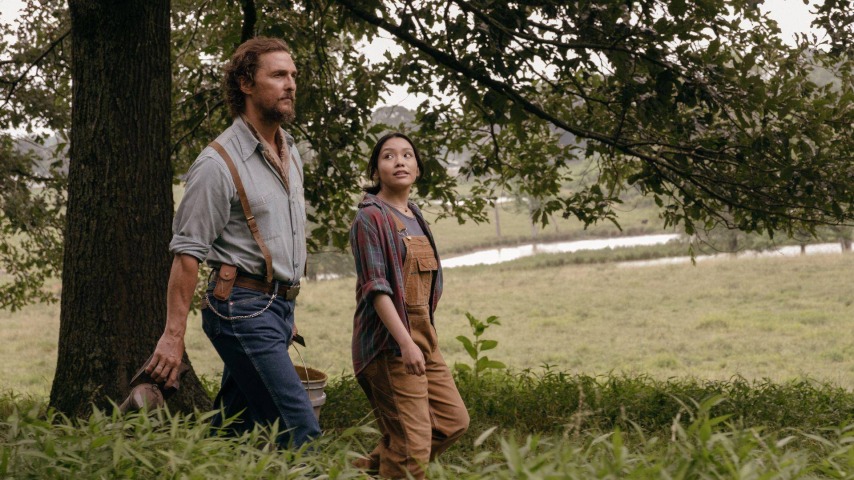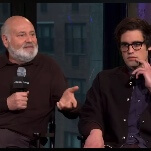It’s been six years since filmmaker Andrew Patterson won himself a cult following with his self-financed sci-fi debut The Vast Of Night. This critic was one of many sucked in by the period details, the impressive aesthetic control, the inventive use of sound and silence, and the trust shown to genre audiences in order for them to stick through long monologues or scenes in total darkness. Whatever Patterson’s next move was, The Vast Of Night made those in the know pay attention. But even the people tapped into the indie world couldn’t have guessed that Patterson would roll out the brassy genre potluck that is The Rivals Of Amziah King (B-), which had its premiere at SXSW 2025.
True to its unwieldy title, The Rivals Of Amziah King doesn’t give a good goddamn about being anything aside from itself. A film with distinct divides inside it demarcating wry Coens-like comedy, low-key modern Western thrills, and sticky-sweet musical earnestness, Patterson’s sophomore effort is an intentionally odd duck, in ways both invigorating and infuriating. Perhaps the only thing unsurprising about the movie is that Matthew McConaughey agreed to star in it. His blend of Kentucky Fried woo-woo and slinky charisma match the tone beat for beat, even after the film stops its pickin’ and grinnin’.
McConaughey plays Amziah King, a small-town blue-collar legend, who attracts redneck rabble to him like nectar draws in the bees he keeps. He’s everyone’s scraggly aging hippie uncle, loved by church ladies, cops, and convicts alike. The first half of the film establishes the found-family familiarity of Amziah’s cohort—a charming array including Vast Of Night’s Jake Horowitz (an easy breakout), a Boomhauer-like Scott Shepherd, Tony Revolori, and Rob Morgan. They can break out into a bluegrass song at the drive-in restaurant just as easily as they can screw something up with their tomfoolery and get someone sent to the hospital after a tragic/hilarious honey extractor accident. One thing stumbles into another, and two developments shock Amziah’s system: His one-time foster daughter Kateri (newcomer Angelina LookingGlass, steely and understated) rolls back into town, and his bees get stolen.
What feels like the slow story of a specific corner of the rural South is then interrupted by scrappy heists and revenge plots, just like it had been earlier interrupted by smiley songs and sharply written comedy scenes (an elementary school bee infestation is a riot). The ride is as wild and jarring as a tipsy truck trip down a bumpy dirt road, but the immediate destinations the film arrives at from moment to moment are almost all smart, witty, and original. The only things that don’t really click are the songs. It’s not that the music is bad. It’s not bad at all. But when folks are playing, for some reason LookingGlass and the other women in the scene plaster on these broad sappy smiles like it’s the greatest thing that’s ever happened to them in their entire lives. It’s cynical, sure, but it’s a disconcerting detail especially considering how the songs themselves are shot.
Patterson thrives with long, flowing tracking moves, watching people walk or rafts float down a river. He also shows care when blocking out his large ensemble cast. The frames look controlled, composed, often warmly lit and packed full. But when the music starts, or the narrative gets especially excited, the editing whips and spasms and freezes like a man writhing with the spirit in him. It’s a disorienting choice, and one that can over-emphasize tunes that already border on cloying. While it’s never explicit that this stylistic choice attempts to evoke something religious, something with a Pentecostal intensity, it’s overwhelming when paired with the dead-eyed beaming; Amziah King protests too much that this music must move its listeners.
And yet for all its overblown sincerity and definition-defying dedication to shifting gears every 20 or so minutes, The Rivals Of Amziah King also smothers the audience with affection. It might feel like three or four contrasting movies offered up on the same table, but the film’s every dish looks to win someone over. Patterson’s dialogue rings true and lets the jokes roll easily off the tongue, and his filmmaking is clean enough that chase scenes flow as clearly as conversations. If the film gets dull, or starts moving in a mode that feels overly quirky, just wait. The next minute could bring out Cole Sprouse’s greasy information broker/fast food worker, or Kurt Russell’s big-time ag biz operator. LookingGlass develops her performance quietly enough to impress, while the singular Patterson offers up another serving of the unexpected, which won him so many people in his corner in the first place.
The unexpected is never the problem in Mimi Cave’s not-so-Fresh sophomore feature Holland (C-). The filmmaker takes on Andrew Sodorski’s Blacklist-topping script that’s been kicking around the industry for over a decade—about a housewife (Nicole Kidman) in the twee-uncanny Dutch-American haven of Holland, Michigan who begins to suspect her husband (Matthew Macfadyen) is up to something sinister—and does exactly what anyone would predict. That applies to both the mystery itself, which is dull and telegraphed, and the kinda-cartoonish Midwestern setting, which mostly gets boiled down to a few shots of tulips, windmills, and bonnets. It’s not that this seemingly nice town has a dark underbelly, which is the typical idea in these kinds of stories, because the town and its people barely act as props for the Lifetime Original plotting.
Kidman’s Nancy Vandergroot is funny enough as a dissatisfied woman tantalized by both her husband Fred’s secrets and her hot coworker Dave (Gael García Bernal), but the script plods through endless domestic waffling rather than developing any paranoia in the relationship dynamics or any personality for the setting itself. It’s not that Holland is uncanny or overly tightknit. It’s just the idea of a weird town, set at a distance to the plot. Even Fred’s obsession with his detailed model train set feels half-hearted, especially considering that this tiny toy community controlled by a single man is both a visual and textual focus of the film. Their son (Jude Hill) is a nonentity, but so is every other member of the community.
As Nancy ropes Dave into her investigation of Fred’s business trips—Possible cover for an affair? Affairs?—the unsupported screenplay-driven excuses roll out. Why won’t Nancy just leave her husband? Well, it might ruin her standing in this anonymous community, though there’s no evidence of it being especially judgmental or severe. Why not just confront her husband? Well, she should have evidence of his philandering so that he (an alleged pillar of the community, also unseen) doesn’t get full custody of the kid. It’s all weak tea, served with a side of stale scenes of suburban espionage—parking lot stakeouts and hotel room break-ins. In lieu of making these grounded moments exciting, Holland is overly reliant on dream sequences to shock a little unearned jolt into the film. These are also the only real instances where Cave brings out a little visual flair, aside from the violence that naturally caps things off. At least the Fresh filmmaker didn’t lose her enjoyment of a nice clear gore shot. It’s just everything else in this lukewarm mystery that’s gone past its expiration date.
But at least one thriller at the fest was having the time of its life. Freaky filmmaker Christopher Landon returns to the high-concept horror world with his updated, campy, dumb-fun take on Phone Booth, Drop (C+). Mostly a two-hander between single mom Violet (Meghann Fahy) and her met-on-an-app first date Henry (Brandon Sklenar), Drop watches a fancy dinner at a nice restaurant go about as wrong as can be, all because of stupid smartphones.
As soon as Violet, a survivor of domestic violence who is now a therapist specializing in survivors, gets comfortable, she starts getting threatening, specific memes (of the ancient Imgflip variety) anonymously airdropped to her phone. After some fake-tech hand-waving, the point becomes clear: Someone nearby enough to observe and airdrop her has taken her kid hostage, and she sure as shit better do what they text her to do or he’s toast. That means juggling her increasingly unhinged tasks, keeping her date interested, and reassuring everyone in the restaurant that she hasn’t totally lost her mind—all while trying to figure out who’s doing this to her.
While it’s never tightly paced or logically coherent enough to actually excite, Drop offers a self-aware take on this brand of nervy fun. Jillian Jacobs and Chris Roach’s script leaves plenty to be desired in terms of thinking things through or making choices that the audience won’t immediately revolt against as nonsense—it doesn’t hold a candle to, say, the sublime problem-solving idiocy of Trap—but Landon gives it all a splashy visual sense. He and the film’s FX team make Violet’s phone-based anxieties look as large as they feel, blasting the texts across the screen and filling a claustrophobic bathroom stall’s walls with surveillance video feeds from inside Violet’s compromised house. Landon also gets in on the silliness, shooting the couple’s hilarious waiter/improv student (Jeffery Self) from a super low angle in order to give his flamboyant riffing a sinister edge.
For her part, Fahy is a game lead, while Sklenar just sits there being handsome, which is all that’s asked of him. But the ceiling is low for this one: Even deciding to go against nature and ignoring every single gaping plot hole or surreal decision, the best one can hope for is seeing a ridiculous idea played out to its ridiculous conclusion. But, for these kinds of movies—especially a harmlessly doofy one like Drop—standing around in the lobby going over how things should have played out is part of the package.
























![HBO teases new Euphoria, Larry David, and much more in 2026 sizzle reel [Updated]](https://img.pastemagazine.com/wp-content/avuploads/2025/12/12100344/MixCollage-12-Dec-2025-09-56-AM-9137.jpg)
















